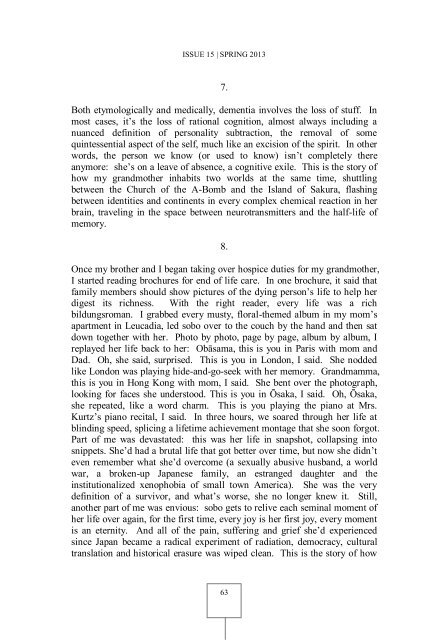Create successful ePaper yourself
Turn your PDF publications into a flip-book with our unique Google optimized e-Paper software.
ISSUE 15 | SPRING 2013<br />
7.<br />
Both etymologically and medically, dementia involves the loss of stuff. In<br />
most cases, it’s the loss of rational cognition, almost always including a<br />
nuanced definition of personality subtraction, the removal of some<br />
quintessential aspect of the self, much like an excision of the spirit. In other<br />
words, the person we know (or used to know) isn’t completely there<br />
anymore: she’s on a leave of absence, a cognitive exile. This is the story of<br />
how my grandmother inhabits two worlds at the same time, shuttling<br />
between the Church of the A-Bomb and the Island of Sakura, flashing<br />
between identities and continents in every complex chemical reaction in her<br />
brain, traveling in the space between neurotransmitters and the half-life of<br />
memory.<br />
8.<br />
Once my brother and I began taking over hospice duties for my grandmother,<br />
I started reading brochures for end of life care. In one brochure, it said that<br />
family members should show pictures of the dying person’s life to help her<br />
digest its richness. With the right reader, every life was a rich<br />
bildungsroman. I grabbed every musty, floral-themed album in my mom’s<br />
apartment in Leucadia, led sobo over to the couch by the hand and then sat<br />
down together with her. Photo by photo, page by page, album by album, I<br />
replayed her life back to her: Obāsama, this is you in Paris with mom and<br />
Dad. Oh, she said, surprised. This is you in London, I said. She nodded<br />
like London was playing hide-and-go-seek with her memory. Grandmamma,<br />
this is you in Hong Kong with mom, I said. She bent over the photograph,<br />
looking for faces she understood. This is you in Ōsaka, I said. Oh, Ōsaka,<br />
she repeated, like a word charm. This is you playing the piano at Mrs.<br />
Kurtz’s piano recital, I said. In three hours, we soared through her life at<br />
blinding speed, splicing a lifetime achievement montage that she soon forgot.<br />
Part of me was devastated: this was her life in snapshot, collapsing into<br />
snippets. She’d had a brutal life that got better over time, but now she didn’t<br />
even remember what she’d overcome (a sexually abusive husband, a world<br />
war, a broken-up Japanese family, an estranged daughter and the<br />
institutionalized xenophobia of small town America). She was the very<br />
definition of a survivor, and what’s worse, she no longer knew it. Still,<br />
another part of me was envious: sobo gets to relive each seminal moment of<br />
her life over again, for the first time, every joy is her first joy, every moment<br />
is an eternity. And all of the pain, suffering and grief she’d experienced<br />
since Japan became a radical experiment of radiation, democracy, cultural<br />
translation and historical erasure was wiped clean. This is the story of how<br />
63


